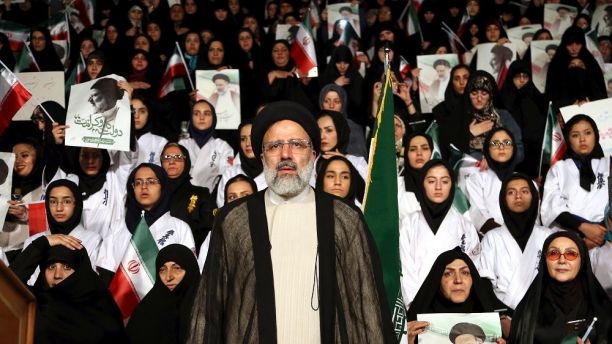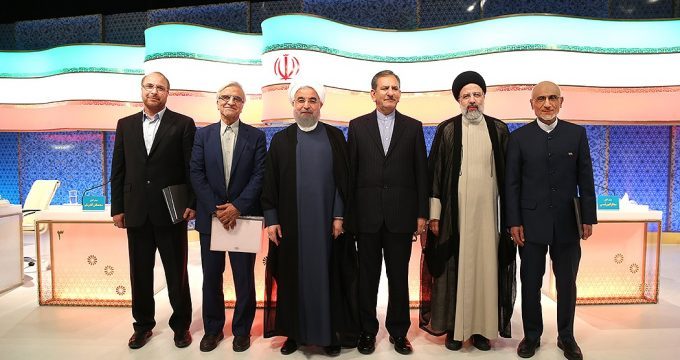The re-election of Hassan Rouhani to another term as president of the Iranian regime came as no surprise to experienced Iran watchers and the larger dissident community; particularly since the election process in Iran is essentially rigged from the start by the process of eliminating thousands of candidates who register to run for the office, but this has not stopped the Iran lobby from claiming the win was a mandate for so-called “moderate” policies.
One example of this myth-making comes from the National Iranian American Council which noted Rouhani’s win with an analysis on its website.
According to the NIAC, more than 41 million Iranians voted in Iran’s May 19th Presidential election, or nearly 75% of the electorate. The NIAC claims that figure included tens of thousands of Iranians in the diaspora with a remarkable feat given the obstacles imposed by Iran’s unelected institutions.
It’s a silly argument to make since many election analysts who have studied Iranian elections have noted the past practice of ballot stuffing and double counting of ballots cast in presidential and city council races in order to boost overall numbers.
There is also the infamous 2009 election “victory” of Mahmoud Ahmadinejad which was widely considered to be illegitimate for the same tactics.
The claim of high Iranian voter turnout would be similar to basing the election turnout for the Hillary Clinton vs. Donald Trump race on counting ballots cast for state races as separate and unique.
It is even more ironic for the NIAC to claim a high turnout from the Iranian diaspora when it has previously openly condemned large portions of the diaspora involved in the Iranian resistance movement, such as the People’s Mujahedin Organization of Iran.
The NIAC also claims that the election was a 57-38% landslide for incumbent Rouhani, and a defeat for so-called hardliners – including the leadership of Iran’s judiciary and Revolutionary Guard Corps (IRGC) – which publicly mobilized for perceived conservative candidate Ebrahim Raisi
What the NIAC doesn’t admit to is that the election was precisely a victory for the hardliners because the regime government is controlled and directed by the same hardliners who claim to be moderates. All Iranian officials from the Rouhani on down to the lowliest village representative all have to swear the same oath of fealty and allegiance to the regime’s religious leadership and theocracy.
There is no distinction within the Iranian regime between moderates or hardliners since all are beholden to the same power structure.
The NIAC also claimed the election was a referendum on the nuclear deal, but what it fails to do is make the distinction of how the election was engineered to deliver a pre-determined outcome. By setting up a race between Rouhani and Raisi, the mullahs created the perception of a moderate vs. hardliner battle and all but ensured Rouhani’s election as a choice of the lesser of two evils.
The election was never about the nuclear deal since most Iranians have not received any benefits from the deal and probably won’t for many more years. For Iranians who voted for Rouhani, the election was simply a choice of choosing a less odious candidate than another, which tends to be the basic choices provided by the mullahs.
To keep that fiction up, Raisi and his supporters are now even accusing Rouhani of rigging the vote with widespread voter fraud.
“Tampering with the numbers of people’s participation is inappropriate. Not sending ballots to centers where the government’s opponent has a chance of getting votes is very inappropriate,” Raisi was quoted as saying.
“I ask the Guardian Council and the judiciary not to let the people’s rights get trampled. If this vote-tampering is not looked into, then the people’s trust will be damaged.”
The claim is humorous given the regime’s predilection for rigging elections, but Raisi’s claims might very well be genuine, but in the end irrelevant since the mullahs got the result they wanted, which was to fool the rest of the world.
The need to fool the world is necessary for the Iranian regime as it continues to implement an aggressive agenda seeking to expand its sphere of influence throughout the region, which is why recent news that Iranian-backed Iraqi Shiite militias were on the very of opening a land corridor from Iran to Assad-regime controlled territory in Syria is worrisome.
The opening of such a corridor would accelerate Iran’s ability to ship weapons and fighters to Syria without having to resort to more clandestine methods such as using commercial Iranian airliners to ferry troops and supplies.
Syrian rebel sources have warned of advances by the Syrian army and Iranian-backed militia to reach the border.
The news of Iranian involvement in other regions included reports from Afghanistan of Pakistani and Iranian nationals fighting for ISIS elements.
Afghanistan Nangarhar provincial Police Chief Abdul Rahman Rahimi said that the Pakistani and Iranian detainees confessed that militants were being funded by Iran and Pakistan.
The attack against the U.S. didn’t stop either after the election as top mullah Ali Khamenei continued his customary verbal broadsides against the U.S. by marking the start of the Muslim holy month of Ramadan by ripping Saudi Arabia, saying its Sunni rival is being pumped for money by the U.S., according to Agence France-Presse.
Khamenei’s comments comes after President Trump brokered a $110 billion defense deal with the Saudis during his first foreign trip in office.
The defense deal between the U.S. and the Saudis will bolster Riyadh’s defense capabilities by providing more equipment and services to combat extremist terror groups and Iran.
Even as the Iran lobby claims the Iran election has resolved much, the opposite has been the truth.
Michael Tomlinson

